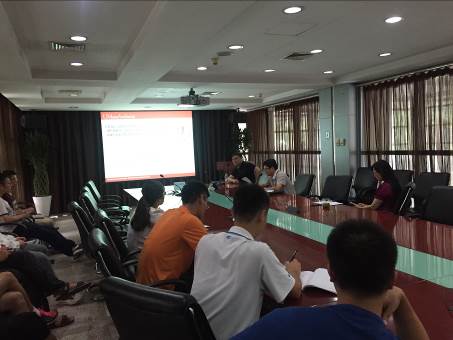On September 6 2016, Prof. J. Joshua Yang from University of Massachusetts visited the Institute of Microelectronics of Chinese Academy of Sciences (IMECAS). He delivered a lecture entitled “Challenges and solutions for memristors used for memory and neuromorphic computing” in IMECAS hosted by Prof. Ming Liu. More than 40 local professionals and graduate students attended the meeting.
Numerous perspective applications have been proposed for memristive devices. However, each application emphasizes on different merits of device properties and imposes different challenges on device performance. A practical solution to those challenges is to add an auxiliary device to each of the memristor. For memory applications, this device is often called “selector”, mainly employed to enable large memristor crossbar arrays by mitigating the so-called “sneak path current” issue with its nonlinear current-voltage characteristic. In thia talk, Prof. J. Joshua Yang had obtained over 1E10 nonlinearity by using engineered materials for such devices. In neuromorphic computing, the accumulation and extrusion of Ca2+ in the pre- and postsynaptic compartments played a critical role in initiating plastic changes in biological synapses. To emulate this fundamental synaptic dynamic process in electronic devices, Prof. J. Joshua Yang developed diffusive Ag-in-oxide memristors with a temporal response during and after stimulation similar to that of the synaptic Ca2+ dynamics. The diffusive memristor and its dynamics enable a direct emulation of both short- and long-term plasticity of biological synapses and provide a viable solution for the crucial synaptic dynamics in neuromorphic computing. The new points of his research on memristor made a big splash and reached an academic discussion.
After the lecture, a symposium was held with the participating researchers from the IMECAS, both sides introduced their recent works and had a heated discussion.

Prof. Yang was giving a talk.
Biography
Dr. Yang is a professor in the Department of Electrical and Computer Engineering at the University of Massachusetts, Amherst. He spent over 8 years at HP Labs before joining UMass in 2015. His current research interests are Nanoelectronics and Nanoionics, especially for energy and computing applications, where he authored and co-authored about 100 papers in peer-reviewed academic journals, and holds 75 granted and over 70 pending US Patents. He obtained his B.A. degree in mechanical engineering from Southeast University in China and PhD from the University of Wisconsin – Madison in Material Science Program. He is a co-chair of the RRAM session of IEDM 2014. He was the chair of the 8th IEEE Nanotechnology SFBA Council Symposium on “Emerging Non-volatile Memory Technologies” and also the chair of the 10th symposium on “The Promise and Progress of Nanotech Enabled 2D Devices and Materials. He has guest-edited three journal special issues on NVRAM and memristor technologies for Nanotechnology, Applied Physics A, and IEEE JETCAS. He serves as in the Editor Boards of Applied Physics A, Scientific Reports.











